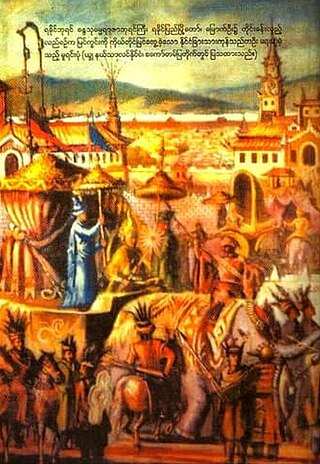Top Qs
Timeline
Chat
Perspective
Sanda Thudhamma
King of Arakan From Wikipedia, the free encyclopedia
Remove ads
Sanda Thudhamma Raza (Arakanese: စန္ဒသုဓမ္မရာဇာ, February 1637 - 20 December 1684) was 24th king of the Mrauk U Kingdom. He reigned from 1652 to 1674. He lost the control of Chittagong during his reign and the Dutch VOC left in 1664 following their trade agreement in 1653. Due to the loss of Chittagong, the kingdom began to declined and isolated after his death in 1684.[1]
The king built and constructed five prominent pagodas of Mrauk-U which still stood today. After his death in 1684, the kingdom fell into dismantled state which internal struggles of the royal court and subsequents overthrowing of kings became common for the next 100 years till the end of the monarchy came in 1784.

The famous Bengali poet Syed Alaol was the poet in his court. He translated Tohfa at the request of Shrichondro Sudhormo or Sanda Thudhamma.[citation needed]
Remove ads
Reign
Summarize
Perspective
At only the age of 13, King Sanda took the throne after death of his father, Thado in 1652, beginning a reign that would span over three decades.[2]
He built several significant pagodas in Mrauk U, including Zinamanaung, Thekyamanaung, Ratanamanaung, Shwekyathein, and Lokamu.[3]
During his reign, Buddhist exchanges with Ceylon continued. In his final year, around forty Arakanese monks traveled to Ceylon at the request of a mission supported by the Dutch. The Dutch, aiming to counter Portuguese Catholic influence in Ceylon, sought to revive the upasampada ordination, which was declining. They turned to Arakan because they had maintained a trading post near Mrauk U from 1626 to 1683, though it was occasionally closed due to other obligations. In 1670, the entire Dutch staff there was massacred. However, while it lasted, the Dutch found the Sanda more cooperative than the Burmese king. Under a 1653 agreement, Sanda allowed them certain privileges, such as appointing their own interpreter and taking their children born to local women.[4]
In 1664, Sanda Thudamma had to cede large amounts of his territories due to an invasion by Mughal Emperor Aurangzeb. In 1666, another invasion by Shaista Khan captured the port of Chittagong. Chittagong remained a key port throughout Mughal rule.[5]
Remove ads
See also
References
Bibliography
Wikiwand - on
Seamless Wikipedia browsing. On steroids.
Remove ads

